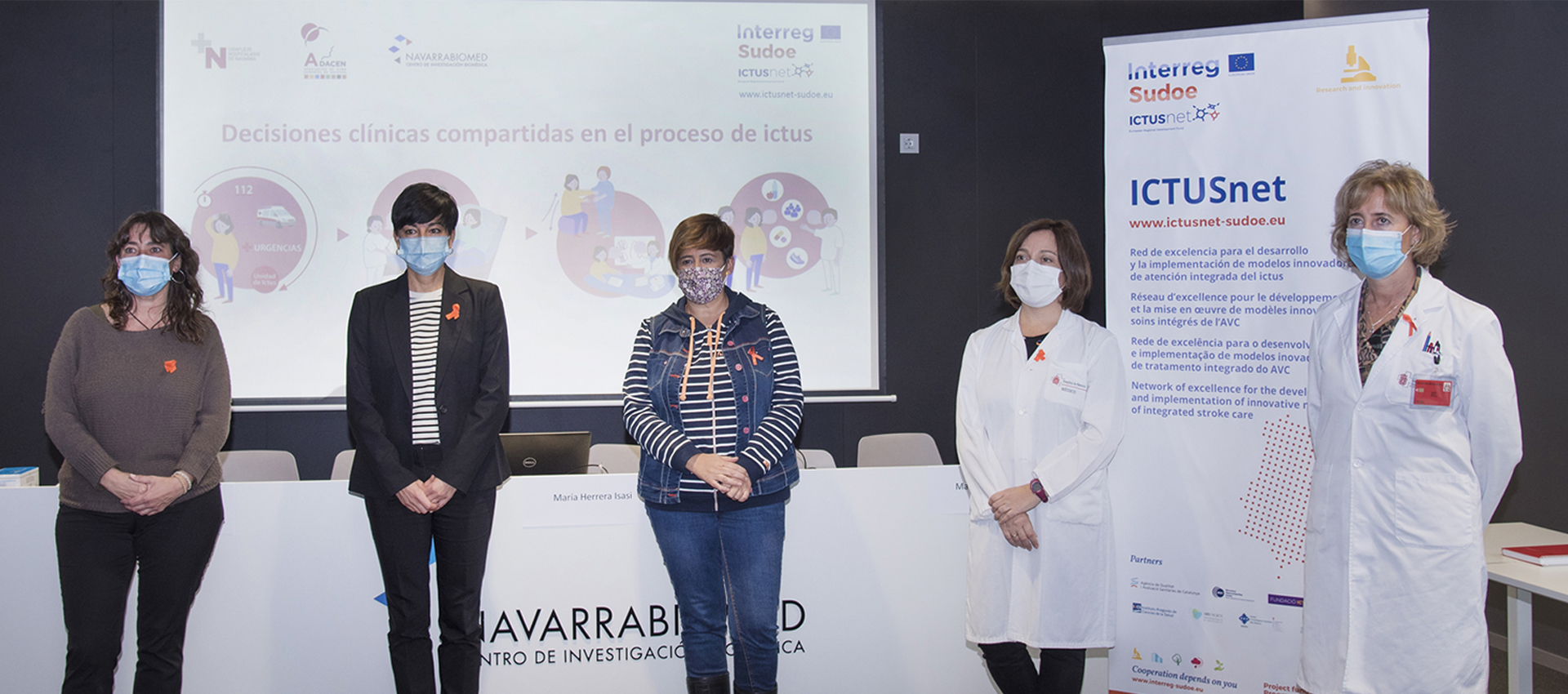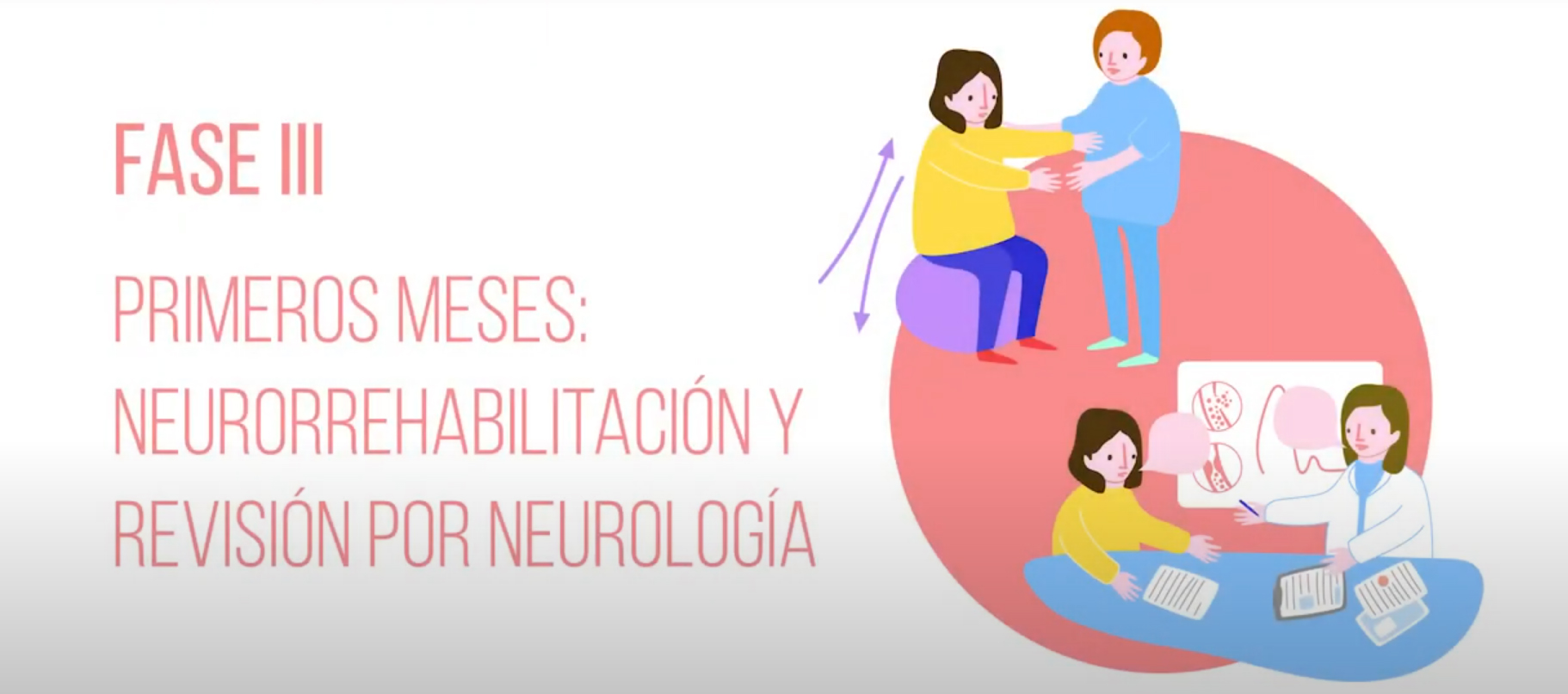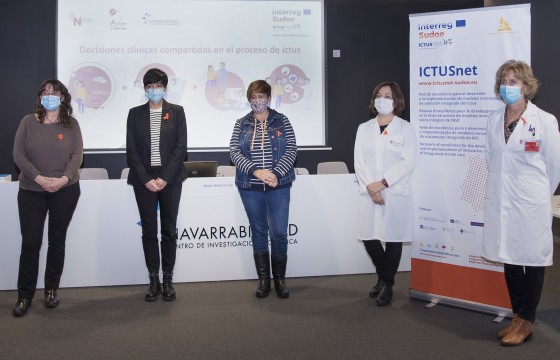
CHN, Navarrabiomed and ADACEN collaborate to promote sharing clinical decisions between professionals and patients in stroke process
- The work was carried out within the framework of ICTUSnet, a European project for interregional collaboration promoting innovation and improved healthcare for stroke patients.
María Herrera Isasi, a neurologist in the Stroke Unit at the Hospital Complex of Navarre (CHN) and the coordinator of the ICTUSnet project in Navarre (which is done at Navarrabiomed), and Silvia Astráin Mendoza, the project leader at the Brain Injury Association of Navarre (ADACEN), gave a press conference today at Navarrabiomed on the conclusions of a multidisciplinary study on sharing clinical decision-making in the healthcare process of stroke patients. This initiative was implemented within the framework of ICTUSnet, a European project for interregional collaboration for innovation and improved healthcare for stroke patients. The speakers were accompanied by Marta Ancín Pagoto, CHN Director of Healthcare Services.
The press conference was held today in commemoration of World Brain Injury Awareness Day and World Stroke Day, which is Thursday, October 29. Stroke is the primary cause of brain injury.
Consensus between professionals and patients
Sharing clinical decisions implies the use of a relationship model between healthcare professionals and patients throughout the diagnostic process and therapy. It also involves the need to keep patients informed during the different healthcare stages and empower them by giving them an active role to play. This kind of decision-making is in line with patient-centered medicine in its aim to provide more humane care. It also involves two-way communication rather than one-sided release of information, and it has been demonstrated that patients adhere better to the chosen procedure.
María Herrera explained what this model involves in healthcare practice. “As professionals, we’re aware that it’s our obligation to inform patients about the procedures available to prevent, diagnose and treat specific health problems, including the different options, their goals and possible consequences. And we do all this by using informed consent forms and providing information during interviews. But now we are going one step further. The idea is to ensure that decision-making includes the other side, namely, the life goals, values, priorities and needs specific to the patient, who, in this case, is a stroke patient or someone at risk of suffering from a stroke, as well as the patient’s family members or representatives, to reach a firm decision together that considers both sides with the active participation of the patient,” she said. She also highlighted the fact that this new model represents a change in the form of communication, which means that professionals will need training, as well as new tools to provide support for ICTs and audiovisual information, along with a commitment from the public authorities to promote this model with patient-centered work areas, as well as models of interdisciplinary action and teamwork.
From this global perspective, the study analyzed the current status of the model of sharing clinical decision-making in the stroke care process in the Navarre Health Service – Osasunbidea. The study involved organizing, in collaboration with ADACEN, four focus group meetings in February and March (prior to the pandemic) made up of representatives of all stakeholders involved: patients, family members, professionals in neurology, neurorehabilitation, primary care and social work, as well as management professionals from the Navarre Ministry of Health, among others.
Silvia Astráin was pleased with how the sessions went. She said, “We were able to provide a place for people to reflect on the topic, share experiences, point out uncovered needs and existing barriers, and identify the areas of healthcare that can be improved.” The ADACEN association, which helps people with acquired brain injury and their families, has been fighting to ensure patients receive the best care since it was founded in 1994. ADACEN officials are therefore pleased that time is being spent to listen to the opinions and needs of patients and their family members so that changes can be made to the process.
Marta Ancín stressed the importance of collaborative work between professionals to promote comprehensive patient care. She also brought up the commitment made by the Navarre Ministry of Health when it implemented its Humanization Strategy of the public health system in 2017. “Despite the delicate experience we are living through, these actions and projects should be maintained to make progress on and improve patients’ satisfaction with the treatment they receive,” Ancín said.
The press conference ended with some words from Iosune Etxebeste Arretxea, a stroke patient, and Pilar Seminario Alonso, a family member. Both participated in the focus groups and wanted to provide a face for all those people who live with the effects of a stroke or who are caregivers or companions.
Educational video and documents
Anyone interested in finding out more about this study on sharing clinical decision-making can consult the technical documentation on the conclusions, the video Working Together on Stroke Care Strategies, and the guidebook for patients and family members.
All these actions fall within the framework of the ICTUSnet Project, which forms part of the Interreg Sudoe Program, an initiative financed by the European Regional Development Fund (ERDF). The mission of ICTUSnet is to create a collaboration network of different Southern European regions made up of patients and professionals working in different stroke-related areas. At the same time, the project aims to create research infrastructure that draws on innovative data analysis technologies to improve comprehensive stroke care systems and reduce the impact of the disease on the population.
Information webinar on the occasion of World Stroke Day
The CHN Stroke Unit team invites all those interested to participate in the webinar “Stroke and COVID-19” on Thursday, October 29 at 4 p.m. Professionals from the CHN, primary care, ADACEN and the Ubarmin Clinic will participate by providing information on how COVID-19 has affected the process of stroke and acquired brain injury in Navarre. Information will also be presented on how healthcare and association resources have been adapted to continue providing care to patients at all stages (including primary care, preventive measures, hospital care, neurorehabilitation and social health resources).



